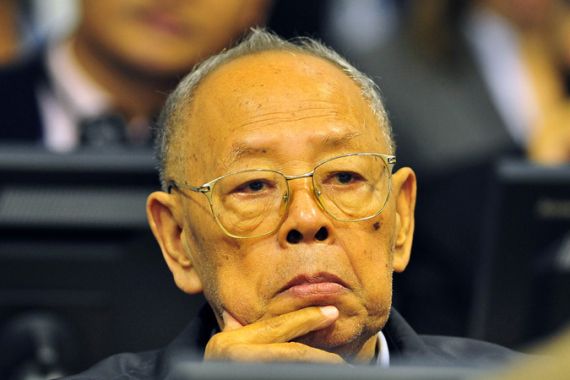Former Khmer Rouge leader dies
Ieng Sang, on trial for genocide and war crimes committed during Pol Pot regime, dies in hospital aged 87, court says.

Ieng Sary, the former Khmer Rouge leader, who was on trial for genocide and war crimes, has died, a tribunal court has said.
The 87-year-old co-founder of Cambodia’s brutal regime blamed for the killing of about two million people in the 1970’s died in a hospital on Thursday after battling declining health.
“We can confirm that Ieng Sary died this morning after being hospitalised since March 4,” Lars Olsen, a spokesperson for the UN-backed war crimes tribunal, said.
The cause was not immediately known, but he had suffered from high blood pressure and heart problems and had been admitted to a Phnom Penh hospital with weakness and severe fatigue.
“We are disappointed that we could not complete the proceeding against Ieng Sary,” Olsen said, adding the case against his colleagues Nuon Chea, the Khmer Rouge’s chief ideologist, and Khieu Samphan, an ex-head of state, will continue and will not be affected.
Sary was being tried by a joint Cambodian-international tribunal along with two other former Khmer Rouge leaders, both in their 80s, and there are fears that they, too, could also die before the tribunal court concludes its proceedings.
He founded the Khmer Rouge with leader Pol Pot, his brother-in-law. The communist regime, which ruled Cambodia from 1975 to 1979, claimed it was building a pure socialist society by evicting people from cities to work in labour camps in the countryside.
Its radical policies led to the deaths of an estimated 1.7 million people from starvation, disease, overwork and execution.
Sary’s wife, former social affairs minister Ieng Thirith, had also been charged but was ruled unfit to stand trial last year because she suffered from a degenerative mental illness, probably Alzheimer’s disease.
He was foreign minister in the regime, and as its top diplomat became a much more recognisable figure internationally than his secretive colleagues.
In 1996, years after the overthrown Khmer Rouge retreated to the jungle, he became the first member of its inner circle to defect, bringing thousands of foot soldiers with him and hastening the movement’s final disintegration.